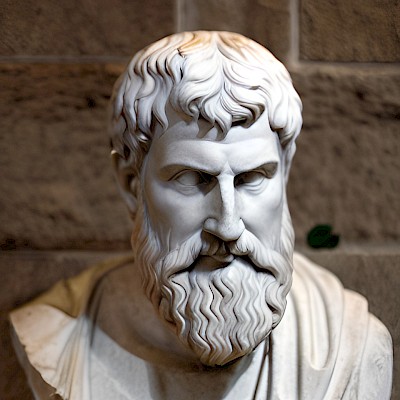Epicurus (341-270 BC) is remembered as a philosopher whose focus on pleasure and the pursuit of happiness left a lasting mark on the history of thought. Epicurean teachings seek harmony and well-being in everyday life, offering a unique perspective on how to find contentment and serenity in an ever-changing world.
Born on the island of Samos, Epicurus founded the Garden School of Philosophy in Athens, where he imparted his revolutionary ideas.
Ataraxia
Her philosophy of him focused on the pursuit of pleasure as a means to achieve happiness, but not in the superficial hedonistic sense. Instead, Epicurus advocated quiet pleasure and the absence of pain, a doctrine known as "ataraxia".
The "ataraxia" represents the tranquility and emotional balance that, according to Epicurus, can be achieved through knowledge, virtue and friendship. He defended that true happiness was found in moderation and mental serenity, instead of the pursuit of excessive pleasures.
Epicurus also addressed the nature of the gods and the immortality of the soul, promoting a secular approach and a naturalistic worldview. The Epicurean philosophy offers comfort and guidance to face life's challenges and find meaning in human existence through rationality.
The Secular Approach of Epicurus
The secular approach refers to a perspective or attitude that is based on the separation of religious or spiritual issues from mundane, social and governmental issues. In other words, implies that decisions, values and practices are guided by non-religious considerations, but by reason, empirical evidence and ethical principles shared by society in general.
In the context of Epicurus's philosophy, his secular approach to him refers to his emphasis on explaining natural phenomena and human life through natural and logical principles, rather than attributing them to divine or supernatural causes.
Epicurus promoted a vision of the world that did not depend on the intervention of gods or spiritual forces in the functioning of reality.
In his philosophy, Epicurus took a naturalistic and materialistic approach to understanding existence and morality. He considered that pleasure and satisfaction could be achieved through knowledge of natural laws and the cultivation of virtue. His secular approach departed from traditional mythological explanations and sought to provide a rational philosophical basis for understanding the world and human life.
Through his philosophical legacy, Epicurus invites us to reflect on the nature of pleasure, happiness and the search for a full life. His teachings continue to be relevant in the search for inner serenity and emotional balance amid the complexities of the modern world.
